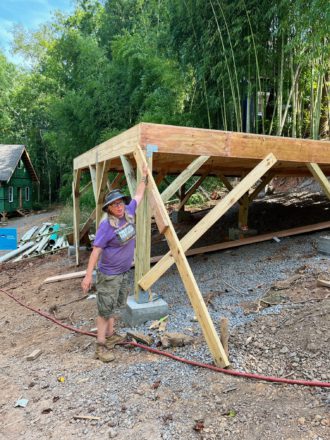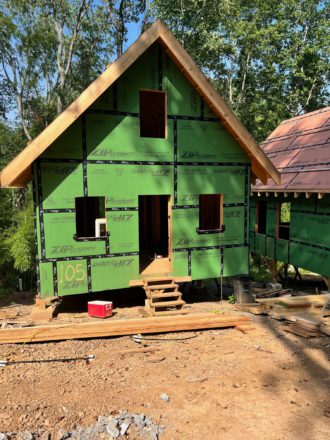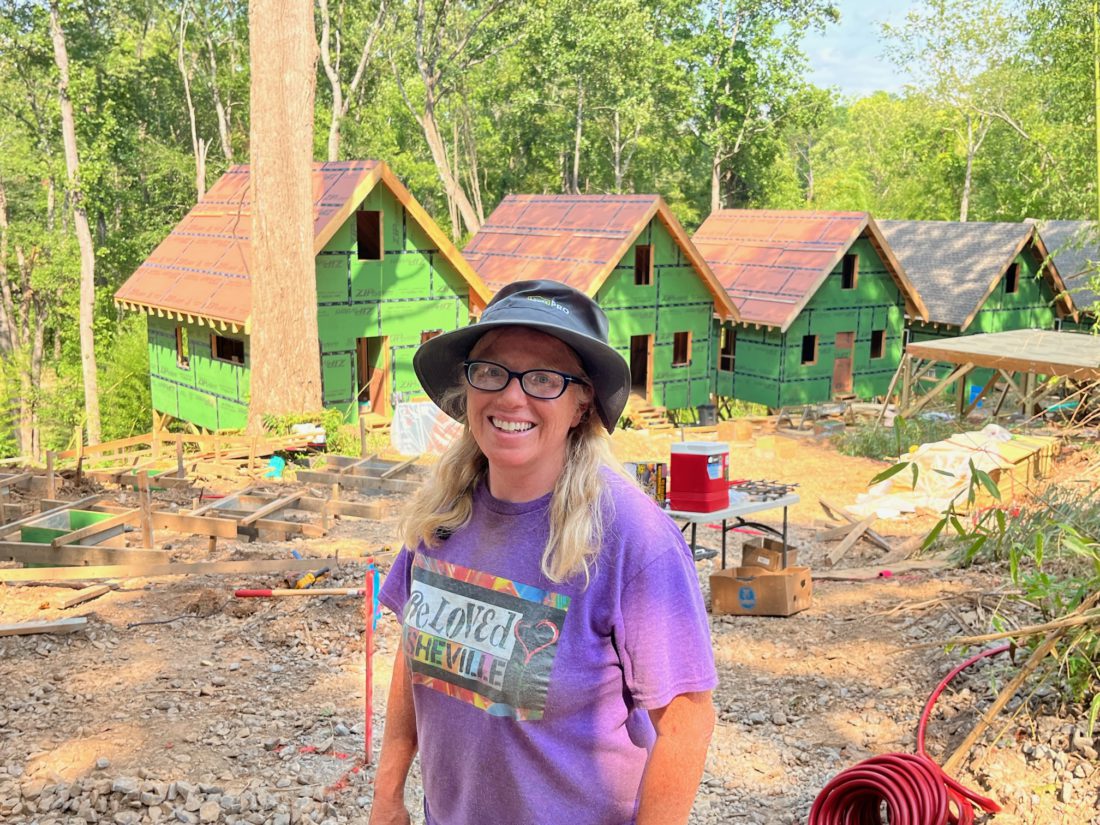In a shady, wooded area in East Asheville, a flurry of construction has been underway since July 2022. The location is the future site of BeLoved Village, a community of 12 microhomes being built by volunteers, largely financed through donations and coordinated by the nonprofit BeLoved Asheville. These 440- to 640-square-foot residences, which will be available to individuals and families earning 30%-40% of the area median income, will help address the community’s need for “deeply affordable” housing, says BeLoved Asheville co-director Amy Cantrell.
Cantrell recently guided Xpress through the construction site, a 1.22-acre parcel donated by Land of Sky United Church of Christ. Six of the village’s 12 microhomes are in various stages of completion. Beginning Wednesday, Aug. 30, Cantrell will lead a “blitz build.” The goal is to complete the framing and roofing of the remaining six properties by Sunday, Sept. 2.
While on-site, Xpress spoke with Cantrell about the health impacts of housing insecurity, combating isolation and her role as the architect of an intentional community.
Xpress: With so many ideas out there on how to provide affordable housing, why did BeLoved decide to build single-family homes?
Cantrell: [Low-income people say], “The kind of housing we get put into is not the kind of housing we want.” Folks say, “We’re 2 miles off the bus line in something that’s barely habitable!” Or, ‘It costs a fortune to heat it in the winter and it’s still not warm!” [People are] walking miles to do laundry and things like that. [They are] feeling very isolated. Or they say, “We’re crowded in these old hotel conversions — public housing — and it feels very chaotic, very institutional, not safe. It doesn’t feel like home. Doesn’t feel like a home environment.”
So, we asked, “What would your dream house look like?” [People said], “We want to live around neighbors that we care about and who care about us. We want land and trees and a place to grow a garden.” People said, “It can be simple, but we’d love to have a full kitchen to be able to make meals for family and our friends and a full bath.”

So, having a roof over one’s head is important, but it isn’t the only thing that’s important.
Home is where we can feel most comfortable and most fully ourselves. [Society is] not always matching the kind of housing we’re building with what “home” does for us as people. … If you feel unsafe in your home, that is not a place where you can orient [yourself], feel like you fully belong or just take a breath. If you don’t have that [ability to rest], you then become less productive in the world in many ways. You become very destabilized.
Tell me more about housing insecurity and how it impacts people’s health.
It’s very costly to people’s health. In fact, we have a group from MAHEC [Mountain Area Health Education Center] in the master’s degree program with UNC Gillings School of Global Public Health to study the health impacts of the BeLoved Village, because we just know it’s going to make an incredible impact.
Homelessness is the most fatal condition in the country. The life expectancy rate is so low — [about] 45 to 55 years. That is an alarming statistic.
BeLoved Village is within walking distance of Tunnel Road, but it’s tucked into a residential neighborhood. Why was it important to you to build affordable housing in a residential location?
One of the things that you’ll see in study after study is you don’t want to concentrate poverty [by relegating all low-income housing to one neighborhood]. Yet these are the housing solutions [society is] typically proposing.
We know that the best outcome [for] helping people lift themselves out of poverty is to be in a neighborhood surrounded by [resources]. [BeLoved Village] is going to be a neighborhood within a neighborhood. We have the best transit in Asheville [on Tunnel Road]. It’s the most robust in terms of it coming most frequently. And [BeLoved Village] actually has a path that will take us right to Tunnel Road, out the back of our development. Residents can easily take public transit. There’s lots of jobs on this corridor. It’s close to schools, close to the library, close to emergency services. … [And] we want to have families and elders and young people here. We know that that [mix of demographics] strengthens the neighborhood.
Homeward Bound is debuting a permanent supportive housing project called Compass Point Village in September. Permanent supportive housing provides people with on-site case management and other services. Will BeLoved Village provide supportive services for people?
This is a really different model. We don’t do case management; we do a community model. You get, maybe, similar outcomes. A lot of times you have a case manager with a caseload of 30 people, and they don’t see their people very often. Whereas in the community model [of Beloved Village], we’re really creating strong community ties. We’ve had about over 1,000 volunteers now [work at Beloved Village]. So [the community] already has a lot of people that love them and care about them. [Residents will have] that sort of support and our team, BeLoved, as a circle of support. We are creating a really strong neighborhood here in terms of internal support.
Will there be formal rules or guidelines for living in BeLoved Village?
We want to draw out the leadership of the folks that are living here. They’ll get to create their own neighborhood covenant with us. That’s a little different than most housing. In most housing, you get a lease — “Here’s the rules. Have a nice day!” Here, we’ll be sitting in a circle, and the residents, with our BeLoved team, will write their covenant. We’re going to talk about “What if somebody breaks that covenant? What if there’s some kind of conflict? How are we going to take care of that?” [It’s important to be] talking about things before they happen. There’s a lot of buy-in here about what this neighborhood’s going to be.

You mentioned how isolation is a health concern and how it can particularly impact people who are unhoused or live on low incomes. What is BeLoved Village going to do to nurture neighbors’ relationships?
Just gathering. Do things like roast marshmallows and tell stories. That is as important part of the housing outcome as anything else. We know that we need engagement to bring these folks together. We’re going to put the garden in the spring. We’re going to plant seeds. We’re going to play volleyball together. Whatever it is, it’s creating those moments where we all can come together and have fun. It also creates a healthy, positive neighborhood. All of that is very intentional.
So, how can people apply to purchase a home in BeLoved Village? And what criteria do people need to meet in order to qualify?
We’re working on that with our residence selection task group. [It’s] made up of community members. We will be putting out an application very soon. The main criteria is folks [need to have] 30% to 40% of the area median income. And we want folks to know they’re getting into a neighborhood. We think [being in a neighborhood] is a really wonderful feature of this, and we want people to understand that that’s what it will be. We’ll be looking at those as the two main criteria for folks coming in.
Do you expect BeLoved will be flooded with housing applications?
Oh, I’m sure!
This interview has been edited for length and clarity.




These microhomes at 440-640 square feet are gigantic compared to the fake housing the city just poured over a million bucks in to subsidize the developers of the rat trap on aston street. 200 square feet. No kitchen. It is a small hotel room. No parking. The developers made a big pronouncement at the beginning of this charade that no public money would be sought. Sure, right up until it was.
Marketing material is pretty comical though. Supposedly will appeal to young, bike oriented folks who work downtown. And who apparently want to pay $1000/ month for a kitchenless room. I guess you need to be dumb and friendless too, because you and a buddy could get a real apartment for same $.
This is a waste of money and resources. It’s even degrading for the people expected to live in them. Beloved is a curse on Asheville and is a part of the homeless industry that has ruined Asheville.
homelessness industry…?
Yes. The homeless industry refers to the many, many local agencies that benefit from all the donations and grants. Agencies like Beloved, homeward bound and ABCCM have no interest in solving the homeless crisis, but thrive on it. These agencies even encourage homeless to come here from other areas of the country. Beloved in particular is detrimental to this area.
Don’t you wonder how much the directors and staff are getting paid? That’s the reporting I want to see.
If you download the non-profit tax report forBeLoved (https://www.guidestar.org/profile/84-3381632), you’ll get the kind of reporting you want to see. None of the staff and directors receive any compensation .
IDK about that source, but if that is true, that alone is a huge red flag that should be investigated.
I knew those numbers didn’t make sense so I pulled two years of beloved’s form 990. The 2022 filings show Beloved alone has collected $3,875,179 since 2020. It has 5 employees. The form says no directors are paid but Amy C isn’t listed as a director. Salaries are also not listed. Now do you see the homeless industry and how people like Amy C. Getting rich? There is too much on these reports that leave me sick at my stomach. Exorbitant amounts spent on “office expenses,” food (for employees) and the like.
Another interesting find is that Amy C. Incorporated in 2019. From reading her mission statement on the articles of incorporation, she’s been planning her tiny home community and break into real estate a long time.
There are 571 unhoused according to the last homeless count. Instead of wasting money on grifters, wouldn’t Asheville have done better to have just paid rent for the homeless? It’s time Asheville got rid of the homeless industry for good.
Jenie, you’ve done your homework and raised interesting questions. Maybe the Mountain Xpress reporter will address some of your concerns.
30 to 40% AMI is approximately $24,000 per year.